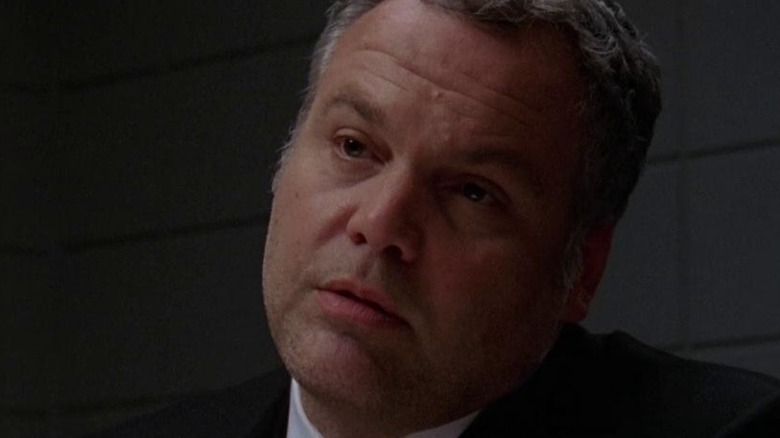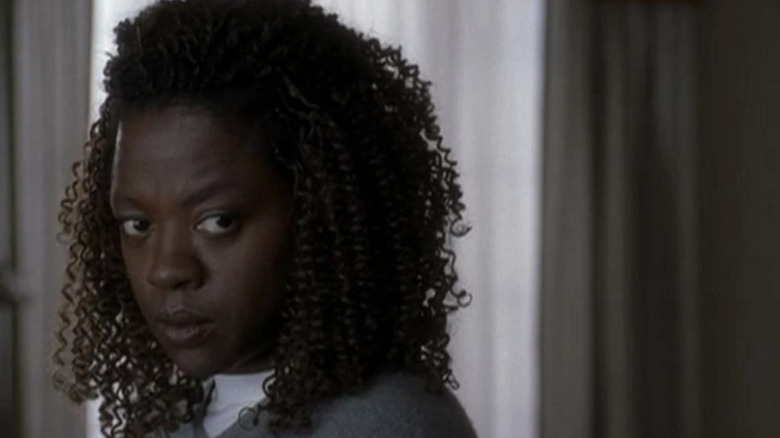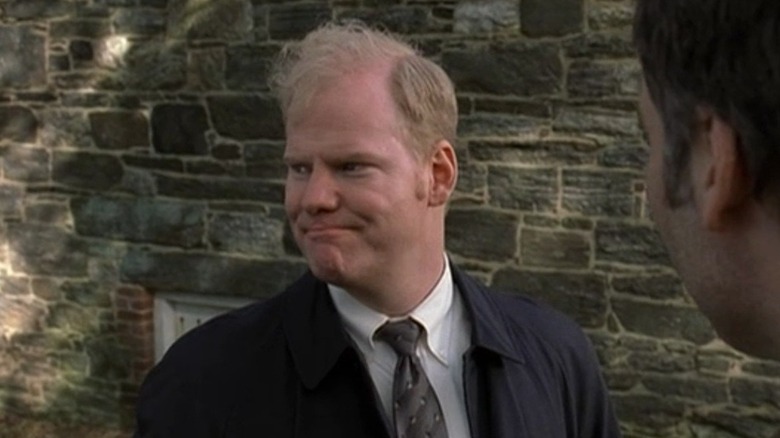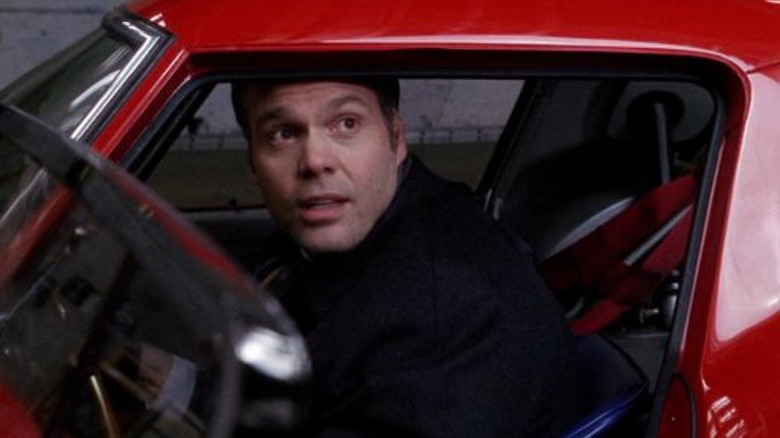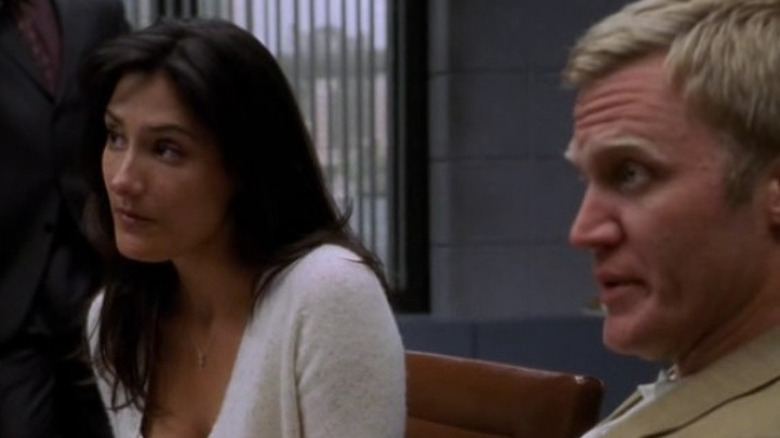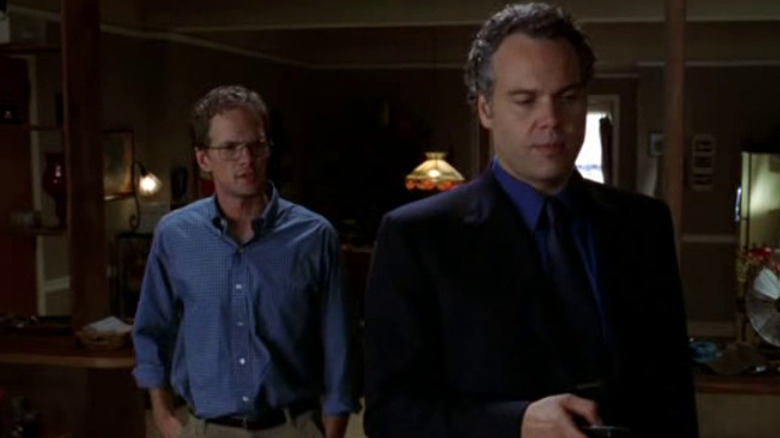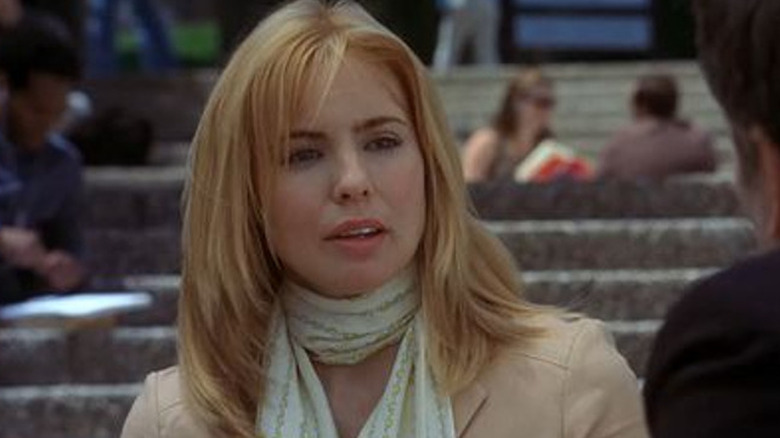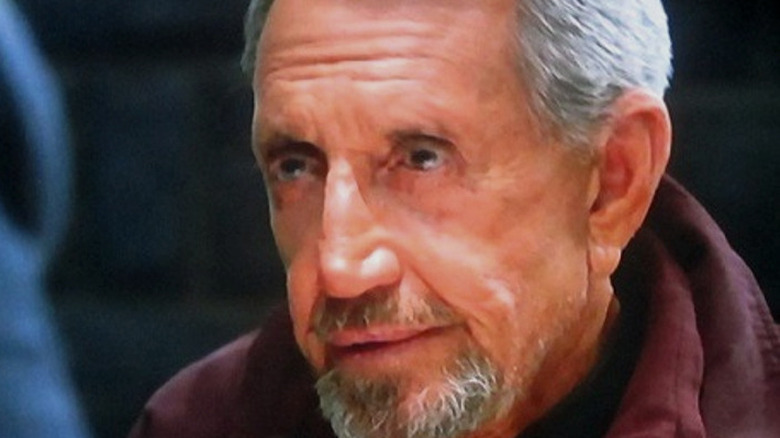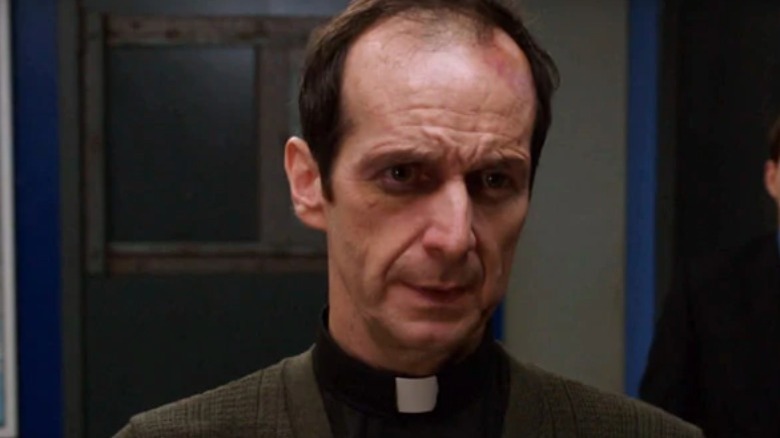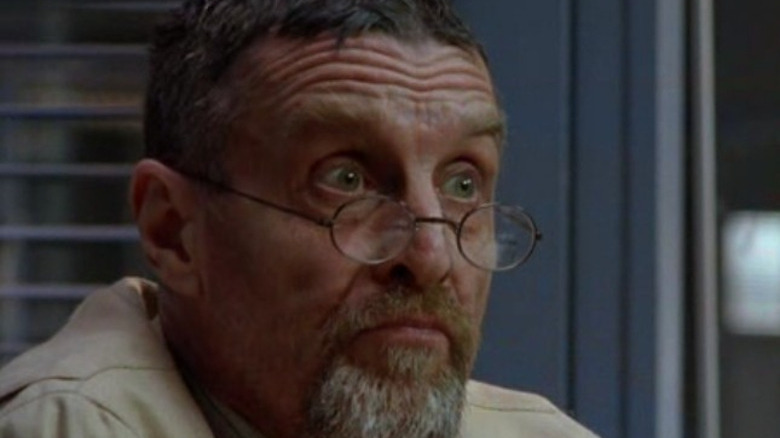The Best Episodes Of Law & Order: Criminal Intent
In many ways, "Law & Order" is the "Star Trek" of crime shows. After all, both franchises have spanned decades and birthed several spinoffs. While the original series dealt with cops and lawyers in New York City, each subsequent series focuses on more specialized areas. For instance, "Law & Order: Special Victims Unit" deals with crimes of a sexual nature, while "Law & Order: Criminal Intent" focuses on the Major Crimes Unit.
"Criminal Intent" could've easily been a straightforward cop show with run-of-the-mill characters who serve only to provide exposition to keep the plot moving. However, the series is much more interesting than that. This time, there's a detective at the center of the action named Robert Goren, played by Vincent D'Onofrio. He marches to the beat of his own drum and often looks at things differently than his colleagues. He's an eccentric and brilliant mind, but he is dealing with some serious trauma.
Having such an interesting lead certainly helps the series stand out, but its long-running storylines, fascinating villains, and occasionally experimental structure, made it truly original. To honor the series, we're looking at some of the very best episodes the series produced and what made them so good.
Badge: Season 1, Episode 20
The murder of Ron Sherwood and his family at first appears to be the work of an unfaithful husband unable to live with his own infidelity who takes it out on the people he loves. There's evidence that he was having an affair, and the murders occur shortly after his wife confronts him about it, which makes it seem pretty obvious what has happened here. For Detective Goren, however, the details of the crime scene don't add up, and his gut takes him and his partner Detective Eames down a dark road of police corruption.
The episode is full of unexpected twists and plenty of opportunities to watch Goren do what he does best — think way outside the box. However, Viola Davis' performance as a woman who is willing to do anything it takes to provide a better life for her family is both riveting and chilling. We get to see some early signs of Davis' Amanda Waller character from the DCEU in the way she carries herself as an authority figure who will not be condescended to. The episode is also early enough in the show's run that a total newcomer can start watching and see just how good this series can be.
Dead: Season 2, Episode 1
Not every episode of "Law & Order: Criminal Intent" begins as a whodunit. Sometimes it uses the reverse whodunit approach, à la "Columbo," and shows us exactly who the murderer is. The mystery then becomes exactly how the detectives are going to piece everything together. It's a fun and suspenseful twist on the usual formula.
The Season 2 episode "Dead" is an excellent example of this. Right at the beginning, we see a mortician strangled to death, and the killer's face is in plain view. The intrigue comes from discovering why this murderer killed him and how Goren and Eames are going to figure it out. Actor Jay O. Sanders does an excellent job of convincing the detectives that he's a perfectly decent family man. If we hadn't seen him commit the murder, we'd probably believe him too.
Coming near the final act of the episode, the moment Goren figures out that Sanders' character is the killer is perfectly understated. Most shows would telegraph this to the audience as overtly as possible, but "Criminal Intent" assumes the people watching are astute enough to pick up on the clue. It's a tense and engaging episode with great guest stars, including Jim Gaffigan as a man in way over his head.
Anti-Thesis: Season 2, Episode 3
Not only is "Anti-Thesis" one of the best episodes of "Law & Order: Criminal Intent," it's also a pivotal one. This episode features the introduction of Nicole Wallace, a character who goes on to serve as a thorn in Goren's side for years to come.
The episode begins as your typical murder investigation. The president of a university is murdered before he can name the next chairman, which puts Goren and Eames on the case. Things become tricky when one of Wallace, a professor from Oxford played by Olivia d'Abo, turns the tables and begins to analyze Goren the same way he analyzes everyone else.
This mutual respect and disdain will carry over to multiple episodes — several of which are on this list — and it always delights. In the grand tradition of Sherlock Holmes and Professor Moriarty, Batman and the Joker, or Clarice Starling and Hannibal Lecter, this is only the beginning of their little dance, and the longer it goes, the more complicated and fascinating it becomes.
Cherry Red: Season 2, Episode 19
The twists in this Season 2 episode start during the cold open. At first, this seems like it's going to be an episode about a young woman who, desperate for money, commits some horrible acts so she can take care of her ailing mother. We see her argue over the value of an heirloom left to her by a deceased neighbor whom she might have killed. Later, she pleads with the facility housing her mother for more time to make a payment. Clearly, this is going to end in her robbing and killing someone. Instead, she winds up dead at the bottom of a flight of stairs.
Things only get more complicated when Goren and Eames discover she had nothing to do with the murder of her neighbor. Discovering who murdered the neighbor, their motivations for doing so, and why the young woman was shoved down the stairs is a thrilling experience. Then, of course, there's the moment where Goren reveals the final shocking twist. Whether you're a fan of the series itself or just like a good mystery, "Cherry Red" is well worth your time.
A Person of Interest: Season 2, Episode 23
One of the common threads through all of these episodes is how many of them shift halfway through. "A Person of Interest," for example, looks like it will be all about Goren and Eames pursuing a scientist who they suspect of being a terrorist intent on spreading anthrax. However, everything changes when the suspect hangs himself in his bathroom. His suicide note blames Goren's intense scrutiny and attacks on his character as the cause for him taking his own life. While the media is happy to blame Goren, he notices the one detail everyone else has ignored: most suicide notes are aimed inward at the victim themselves, not at some outside influence.
Enter Nicole Wallace.
Goren quickly realizes that this whole thing was designed by Wallace to make him look bad and take him down. Once Wallace is part of the narrative, the pacing and intensity pick up. She's so good at evading any evidence that might prove her guilt that the audience pulls their hair out trying to guess how Goren will trick her. When he finally does, it's deeply satisfying. However, it is made abundantly clear that this isn't the last time we'll be seeing Nicole.
If you or anyone you know is having suicidal thoughts, please call the National Suicide Prevention Lifeline at 1-800-273-TALK (8255).
But Not Forgotten: Season 3, Episode 4
Like an earlier entry on this list, "Badge," "But Not Forgotten" is another excellent episode dealing with police corruption. However, that's not all it's about.
A woman named Frieda Merced goes missing after trying to flee from an unseen man. The investigation shows that the man has ties to an incarcerated mobster and that the woman's brother was a professional killer who had been murdered two years previously. Isobel, the spouse of the deceased hitman, played by Alicia Coppola, has since remarried Earl, a dirty cop with a collection of canes played by Terry Serpico. Goren and Eames suspect Earl was involved with the missing woman's disappearance.
When the man the woman was running from winds up dead, the wounds on his head look as though they came from the handle on one of Earl's canes. The couple is questioned, but their stories don't add up. Seeing Goren pit the two against each other is riveting, and the final reveal is completely unexpected.
Want: Season 4, Episode 3
After a young ballerina, who moonlights as an exotic dancer, is murdered following a confrontation outside the club where she works, the man waiting for her outside becomes the main suspect. However, his motivations for wanting to speak with her don't naturally lead to murder. Also, something about how the body had been treated suggests to Goren that this wasn't necessarily done out of anger.
What makes this such a great episode isn't the mystery. It quickly becomes apparent that John, a shy candy maker played by Neil Patrick Harris, is the culprit. What's so fascinating is the vulnerability with which he plays the character and Goren's attempt to understand him.
The final twist, though shocking, has nothing to do with a last-minute reveal. Instead, it sees Goren turning his back on his partner and superiors to do what he believes is right. It's a moral dilemma that asks the audience to think about what they would have done in his situation, rather than beating them over the head with an obvious message.
Grow: Season 5, Episode 1
The fifth season of "Law & Order: Criminal Intent" got things started with a real doozy of an episode that sees the return of that pesky Nicole Wallace. She has proven herself to be so vile and brilliant that we don't doubt her capacity for evil. When it's revealed that her own daughter died at sea, we can't help but assume she murdered her child. That's just how despicable this person is. Now that she is about to get remarried to a single father, we have to assume that a little girl's life is in danger.
However, there's something different about Nicole this time. She usually provides coy answers to direct questions with a sly smirk, but now she seems vulnerable, genuinely worried that something might happen to the child of the man she's pretending to love. Showing us a side of Nicole that we've never seen before adds yet another level of complexity to her character and is an excellent way of keeping the audience on their toes to the final, surprising moment.
Endgame: Season 6, Episode 21
Another common thread running through most of these episodes is that many of them connect to Goren and Eames directly. We dig into their personal lives in a way that's rare for these kinds of police procedurals. A massive revelation comes in the penultimate episode of Season 6, "Endgame."
Mark Brady, played masterfully by the legendary Roy Scheider, is a serial killer about to be put to death. In hopes of delaying things and controlling his own demise, he uses this time to play a game with Detective Goren. He reveals the locations of his hidden scrapbooks which contain pictures of his victims before he killed them. This also leads them to a few more victims they didn't already know about. The whole game seems pointless until one of the pictures sets off alarm bells in Goren's head.
While this main plot is happening, Goren occasionally visits his sick mother. Looking through pictures, he sees one of her from before he was born. It is distressingly similar to one of the pictures in Brady's collection. It turns out that Brady has a very long history with Goren that he knew nothing about. The truth of that connection shakes him to his very core.
Amends: Season 7, Episode 1
Until now, most of these episodes have been primarily dealing with the character of Goren. In the Season 7 opener, "Amends," we get a look at the private life of Detective Eames (Kathryn Erbe). Years ago, her husband, who was also a cop, was murdered. A man was arrested and put in prison. As far as Eames, and everyone else, was concerned, justice was served. This episode proves, however, that this wasn't the case.
After a cop related to her husband's murder trial is murdered, everyone is out for blood. When these "Law & Order" cops lose one of their own, they become blinded by their need to convict someone. They arrest an innocent man and, as usual, Goren is the only one who thinks they may be going down the wrong path. This puts him at odds with his partner and practically every cop in New York.
Then another witness from her husband's trial is killed with the same weapon as the cop at the beginning of the episode — meaning that they arrested the wrong man. Once they find the real killer, it comes out that the man who killed Eames' husband is still out there too. It's an emotional and gripping story that pushes Eames' character like never before.
Last Rites
Yet another element most of these episodes share is police corruption. Many of the folks assigned to serve and protect in this series aren't as virtuous and honest as they first appear. Exploring how this manifests itself is one of the show's most interesting aspects. It doesn't want to hold your hand and comfort you. Instead, it dwells in the morally murky areas of law enforcement and asks you to make up your own mind.
This is what makes "Last Rites" work so well. It's about a priest coming forward with information regarding a murder. The details are given to him via a deathbed confession. His vow prevents him from giving to revealing who made this confession, but there's enough there for the Major Crimes Unit to get started. This is one of the episodes not to feature Vincent D'Onofrio and Kathryn Erbe as Goren and Eames, and it does suffer a little from their absence. However, the adversarial relationship between Mike Logan and a deeply corrupt assistant district attorney is rich enough to keep you watching and guessing.
Frame: Season 7, Episode 22
Season 7 ends with bombshell after bombshell as Goren's sanity is driven to its breaking point with a puzzle that just doesn't make sense. First, his brother is murdered. His reaction is so intense, and his conviction that his old nemesis Nicole Wallace has something to do with it makes his peers doubt him. Then his mentor Dr. Declan Gage (portrayed by the incredible John Glover) is attacked, only furthering his suspicions. While everything certainly points to Wallace being the culprit, a major twist halfway through the episode sends everything into a spiral.
In some ways, "Frame" plays out like David Fincher's "Seven" or a really good "Saw" film without the intense gore. Someone has constructed this elaborate puzzle with all of Goren's insecurities and blind spots in mind. At first, it seems like the intent is to break him down and put him out of commission. When the truth comes out and the motive is revealed, we learn that the intention of the killer is shockingly heartfelt.
